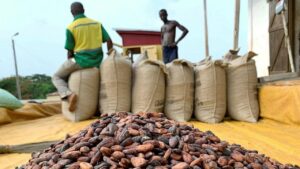
A recent policy shift by the United States is raising alarm among Ghana’s export community. The U.S. government has announced a 10% tariff on selected imports—a decision that stands to directly impact several of Ghana’s top-performing non-traditional export sectors.
Among the affected categories are processed cocoa products, textiles and garments, cashew, shea butter, and a range of fresh agricultural produce—exports that have been central to Ghana’s diversification efforts and foreign exchange strategy.
While Ghana remains a global leader in raw cocoa production, value-added cocoa exports have been gaining ground, thanks to targeted investment and trade frameworks like the African Growth and Opportunity Act (AGOA). However, with the new tariff in place, the price competitiveness of Ghanaian products in the U.S. market could be significantly weakened.
The textile and garment sector, which has seen steady—though modest—growth under AGOA, also risks losing its edge. Industry leaders warn that the additional cost burden could tip the scales in favor of other low-cost producers outside Africa.
MAY INTEREST YOUGhana’s Inflation Outlook: World Bank Projects 17.2% for 2025
This development comes at a critical time for Ghana, as it works to deepen its industrial base, reduce dependency on raw material exports, and boost non-traditional sectors.
Trade analysts suggest that this policy shift from the U.S. could dampen Ghana’s momentum in expanding its export footprint—particularly in value-added segments. Some have called for a stronger pivot towards regional markets, leveraging the African Continental Free Trade Area (AfCFTA) as both a buffer and a long-term growth engine.
In response, Ghanaian government officials have initiated diplomatic discussions with U.S. Ambassador to Ghana, Virginia Palmer. Closed-door meetings held on April 7 focused on finding ways to mitigate the tariff’s impact and safeguard Ghana’s access to its second-largest export destination.
At Bizexcel Partners, we continue to monitor developments in global trade policy and their implications for West African markets. As always, we encourage our network to consider both the challenges and the emerging opportunities as the trade landscape evolves.


